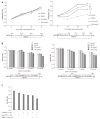Nuclear heat shock protein 110 expression is associated with poor prognosis and hyperthermo-chemotherapy resistance in gastric cancer patients with peritoneal metastasis
- PMID: 29204054
- PMCID: PMC5698247
- DOI: 10.3748/wjg.v23.i42.7541
Nuclear heat shock protein 110 expression is associated with poor prognosis and hyperthermo-chemotherapy resistance in gastric cancer patients with peritoneal metastasis
Abstract
Aim: To investigate the significance of heat shock protein 110 (HSP110) in gastric cancer (GC) patients with peritoneal metastasis undergoing hyperthermo-chemotherapy.
Methods: Primary GC patients (n = 14) with peritoneal metastasis or positive peritoneal lavage cytology who underwent distal or total gastrectomy between April 2000 and December 2011 were enrolled in this study. The patients underwent postoperative intraperitoneal hyperthermo-chemotherapy using a Thermotron RF-8 heating device two weeks after surgery. We analyzed nuclear HSP110 expression in surgically resected tumors using immunohistochemistry. Additionally, the effect of HSP110 suppression on hyptherthermo-chemosensitivity was assessed in vitro in the MKN45 GC cell line using the HSP inhibitor KNK437.
Results: HSP110 immnohistochemical staining in 14 GC patients showed that five (35.7%) samples belonged to the low expression group, and nine (64.3%) samples belonged to the high expression group. Progression-free survival was significantly shorter in the HSP110 high-expression group than in the low-expression group (P = 0.0313). However, no significant relationships were identified between HSP110 expression and the clinicopathological characteristics of patients. Furthermore, high HSP110 expression was not an independent prognostic factor in GC patients with peritoneal metastasis (P = 0.0625). HSP110 expression in MKN45 cells was suppressed by KNK437 at the hyperthermic temperature of 43 °C in vitro. Comparison of MKN45 cell proliferation in the presence and absence of KNK437 at 43 °C, revealed that proliferation was significantly decreased when HSP110 was inhibited by KNK437. Additionally, HSP110 suppression via HSP inhibitor treatment increased cellular sensitivity to hyperthermo-chemotherapy in vitro.
Conclusion: The expression of nuclear HSP110 in GC patients might be a new marker of chemosensitivity and a therapeutic target for patients who are tolerant to existing hyperthermo-chemotherapies.
Keywords: Drug resistance; Gastric cancer; Heat shock protein 110; Hyperthermia; Hyperthermo-chemotherapy; Peritoneal metastasis.
Conflict of interest statement
Conflict-of-interest statement: None of the authors have conflict of interests to disclose.
Figures



Similar articles
-
Nuclear heat shock protein 110 expression is associated with poor prognosis and chemotherapy resistance in gastric cancer.Oncotarget. 2016 Apr 5;7(14):18415-23. doi: 10.18632/oncotarget.7821. Oncotarget. 2016. PMID: 26943774 Free PMC article.
-
Feasibility study of postoperative intraperitoneal hyperthermochemotherapy by radiofrequency capacitive heating system for advanced gastric cancer with peritoneal seeding.Int J Hyperthermia. 2007 Sep;23(6):493-500. doi: 10.1080/02656730701658234. Int J Hyperthermia. 2007. PMID: 17952763 Clinical Trial.
-
A controlled clinical study of serosa-invasive gastric carcinoma patients who underwent surgery plus intraperitoneal hyperthermo-chemo-perfusion (IHCP).Gastric Cancer. 2001;4(1):27-33. doi: 10.1007/s101200100013. Gastric Cancer. 2001. PMID: 11706624 Clinical Trial.
-
Regional but fatal: Intraperitoneal metastasis in gastric cancer.World J Gastroenterol. 2016 Sep 7;22(33):7478-85. doi: 10.3748/wjg.v22.i33.7478. World J Gastroenterol. 2016. PMID: 27672270 Free PMC article. Review.
-
Current status and future directions in gastric cancer with peritoneal dissemination.Surg Oncol Clin N Am. 2012 Oct;21(4):625-33. doi: 10.1016/j.soc.2012.07.002. Epub 2012 Sep 4. Surg Oncol Clin N Am. 2012. PMID: 23021720 Review.
Cited by
-
KNK437 restricts the growth and metastasis of colorectal cancer via targeting DNAJA1/CDC45 axis.Oncogene. 2020 Jan;39(2):249-261. doi: 10.1038/s41388-019-0978-0. Epub 2019 Sep 2. Oncogene. 2020. PMID: 31477839
-
The Prognostic Significance of Hsp70 in Patients with Colorectal Cancer Patients: A PRISMA-Compliant Meta-Analysis.Biomed Res Int. 2021 Apr 16;2021:5526327. doi: 10.1155/2021/5526327. eCollection 2021. Biomed Res Int. 2021. PMID: 33954173 Free PMC article.
-
Heat Shock Proteins and Ovarian Cancer: Important Roles and Therapeutic Opportunities.Cancers (Basel). 2019 Sep 18;11(9):1389. doi: 10.3390/cancers11091389. Cancers (Basel). 2019. PMID: 31540420 Free PMC article. Review.
-
Knockdown of HSP110 attenuates hypoxia-induced pulmonary hypertension in mice through suppression of YAP/TAZ-TEAD4 pathway.Respir Res. 2022 Aug 19;23(1):209. doi: 10.1186/s12931-022-02124-4. Respir Res. 2022. PMID: 35986277 Free PMC article.
-
Selecting the first chemical molecule inhibitor of HSP110 for colorectal cancer therapy.Cell Death Differ. 2020 Jan;27(1):117-129. doi: 10.1038/s41418-019-0343-4. Epub 2019 May 8. Cell Death Differ. 2020. PMID: 31068676 Free PMC article.
References
-
- Ferlay J, Shin HR, Bray F, Forman D, Mathers C, Parkin DM. Estimates of worldwide burden of cancer in 2008: GLOBOCAN 2008. Int J Cancer. 2010;127:2893–2917. - PubMed
-
- Bang YJ, Van Cutsem E, Feyereislova A, Chung HC, Shen L, Sawaki A, Lordick F, Ohtsu A, Omuro Y, Satoh T, et al. Trastuzumab in combination with chemotherapy versus chemotherapy alone for treatment of HER2-positive advanced gastric or gastro-oesophageal junction cancer (ToGA): a phase 3, open-label, randomised controlled trial. Lancet. 2010;376:687–697. - PubMed
-
- Koizumi W, Narahara H, Hara T, Takagane A, Akiya T, Takagi M, Miyashita K, Nishizaki T, Kobayashi O, Takiyama W, et al. S-1 plus cisplatin versus S-1 alone for first-line treatment of advanced gastric cancer (SPIRITS trial): a phase III trial. Lancet Oncol. 2008;9:215–221. - PubMed
MeSH terms
Substances
LinkOut - more resources
Full Text Sources
Other Literature Sources
Medical
Research Materials
Miscellaneous

